Sociology Report: Users’ Awareness of Privacy on Facebook in Australia
VerifiedAdded on 2023/01/18
|16
|4906
|69
Report
AI Summary
This sociology report investigates Facebook users' awareness of privacy in Australia. The study explores factors influencing information disclosure and privacy protection on the platform. It examines user behaviors, knowledge of Facebook's privacy policies, and concerns regarding data security. The research aims to determine if Facebook users are aware of the risks associated with sharing personal information, including potential identity theft, and whether they take measures to limit the visibility of their data. The report delves into legal aspects related to privacy on social networking sites, the visibility of online profiles, and the influence of online policies on user privacy. It anticipates perspectives on protection and information disclosure, analyzing how users control and protect their profile information. The report includes a literature review on online social networking and privacy.
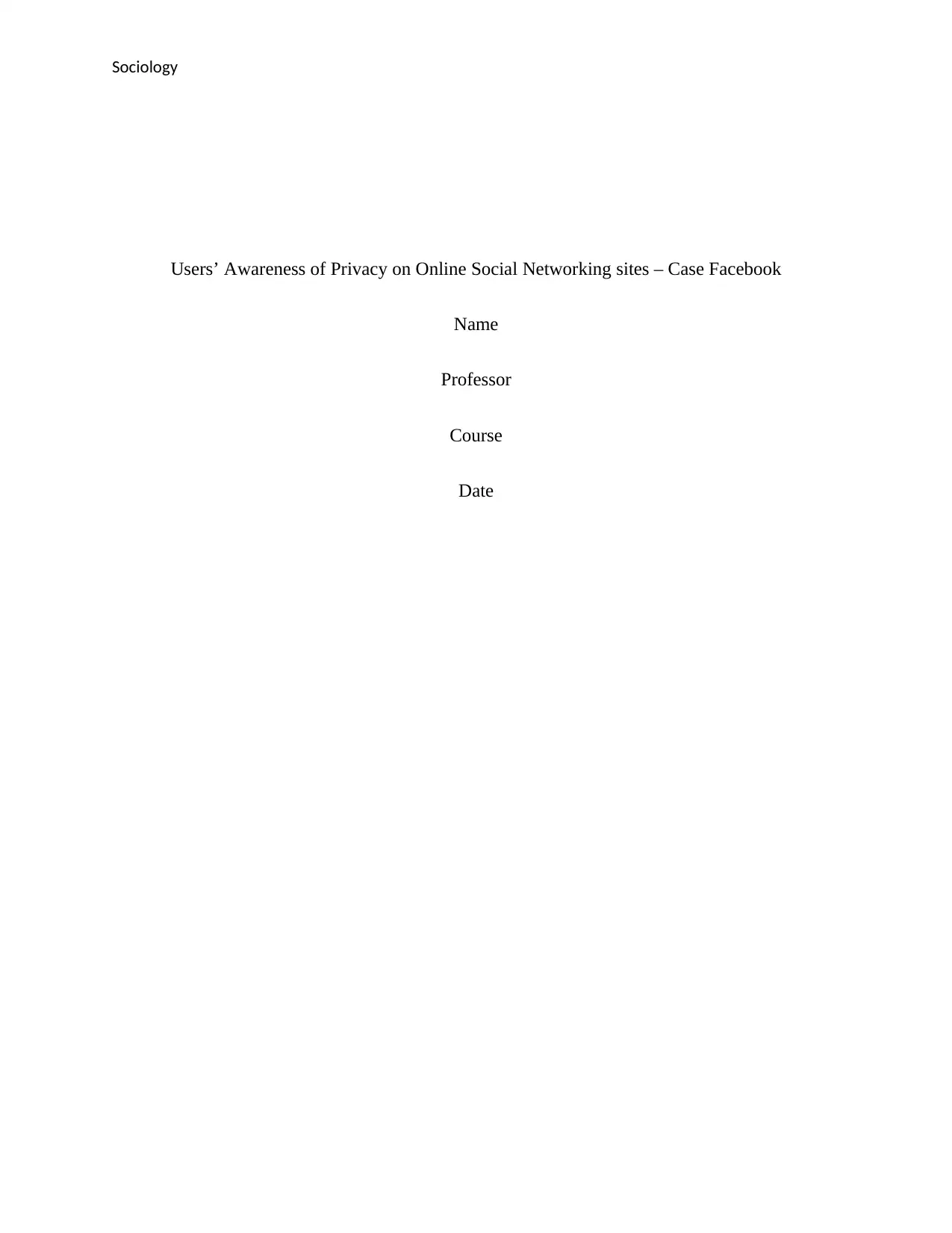
Sociology
Users’ Awareness of Privacy on Online Social Networking sites – Case Facebook
Name
Professor
Course
Date
Users’ Awareness of Privacy on Online Social Networking sites – Case Facebook
Name
Professor
Course
Date
Paraphrase This Document
Need a fresh take? Get an instant paraphrase of this document with our AI Paraphraser
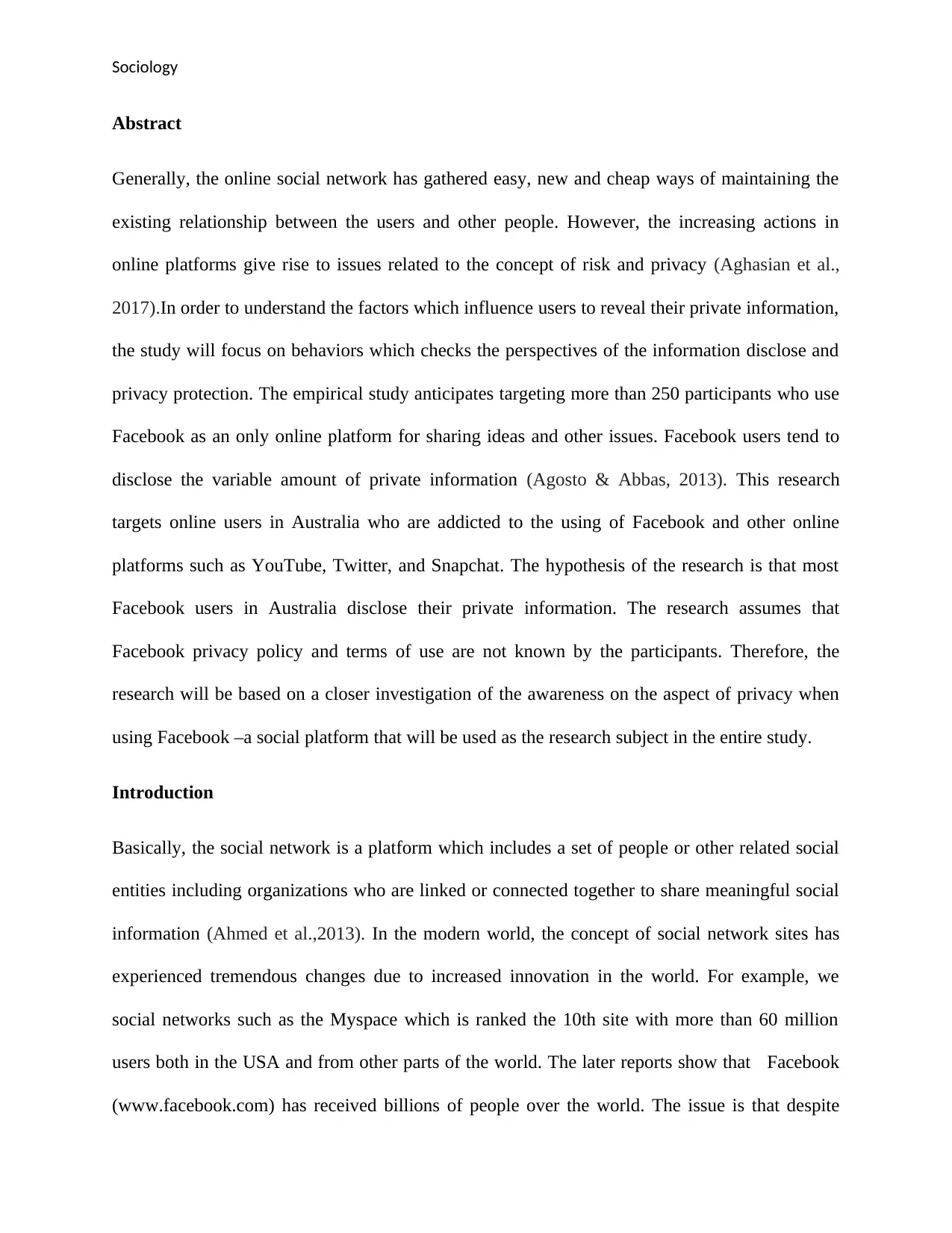
Sociology
Abstract
Generally, the online social network has gathered easy, new and cheap ways of maintaining the
existing relationship between the users and other people. However, the increasing actions in
online platforms give rise to issues related to the concept of risk and privacy (Aghasian et al.,
2017).In order to understand the factors which influence users to reveal their private information,
the study will focus on behaviors which checks the perspectives of the information disclose and
privacy protection. The empirical study anticipates targeting more than 250 participants who use
Facebook as an only online platform for sharing ideas and other issues. Facebook users tend to
disclose the variable amount of private information (Agosto & Abbas, 2013). This research
targets online users in Australia who are addicted to the using of Facebook and other online
platforms such as YouTube, Twitter, and Snapchat. The hypothesis of the research is that most
Facebook users in Australia disclose their private information. The research assumes that
Facebook privacy policy and terms of use are not known by the participants. Therefore, the
research will be based on a closer investigation of the awareness on the aspect of privacy when
using Facebook –a social platform that will be used as the research subject in the entire study.
Introduction
Basically, the social network is a platform which includes a set of people or other related social
entities including organizations who are linked or connected together to share meaningful social
information (Ahmed et al.,2013). In the modern world, the concept of social network sites has
experienced tremendous changes due to increased innovation in the world. For example, we
social networks such as the Myspace which is ranked the 10th site with more than 60 million
users both in the USA and from other parts of the world. The later reports show that Facebook
(www.facebook.com) has received billions of people over the world. The issue is that despite
Abstract
Generally, the online social network has gathered easy, new and cheap ways of maintaining the
existing relationship between the users and other people. However, the increasing actions in
online platforms give rise to issues related to the concept of risk and privacy (Aghasian et al.,
2017).In order to understand the factors which influence users to reveal their private information,
the study will focus on behaviors which checks the perspectives of the information disclose and
privacy protection. The empirical study anticipates targeting more than 250 participants who use
Facebook as an only online platform for sharing ideas and other issues. Facebook users tend to
disclose the variable amount of private information (Agosto & Abbas, 2013). This research
targets online users in Australia who are addicted to the using of Facebook and other online
platforms such as YouTube, Twitter, and Snapchat. The hypothesis of the research is that most
Facebook users in Australia disclose their private information. The research assumes that
Facebook privacy policy and terms of use are not known by the participants. Therefore, the
research will be based on a closer investigation of the awareness on the aspect of privacy when
using Facebook –a social platform that will be used as the research subject in the entire study.
Introduction
Basically, the social network is a platform which includes a set of people or other related social
entities including organizations who are linked or connected together to share meaningful social
information (Ahmed et al.,2013). In the modern world, the concept of social network sites has
experienced tremendous changes due to increased innovation in the world. For example, we
social networks such as the Myspace which is ranked the 10th site with more than 60 million
users both in the USA and from other parts of the world. The later reports show that Facebook
(www.facebook.com) has received billions of people over the world. The issue is that despite
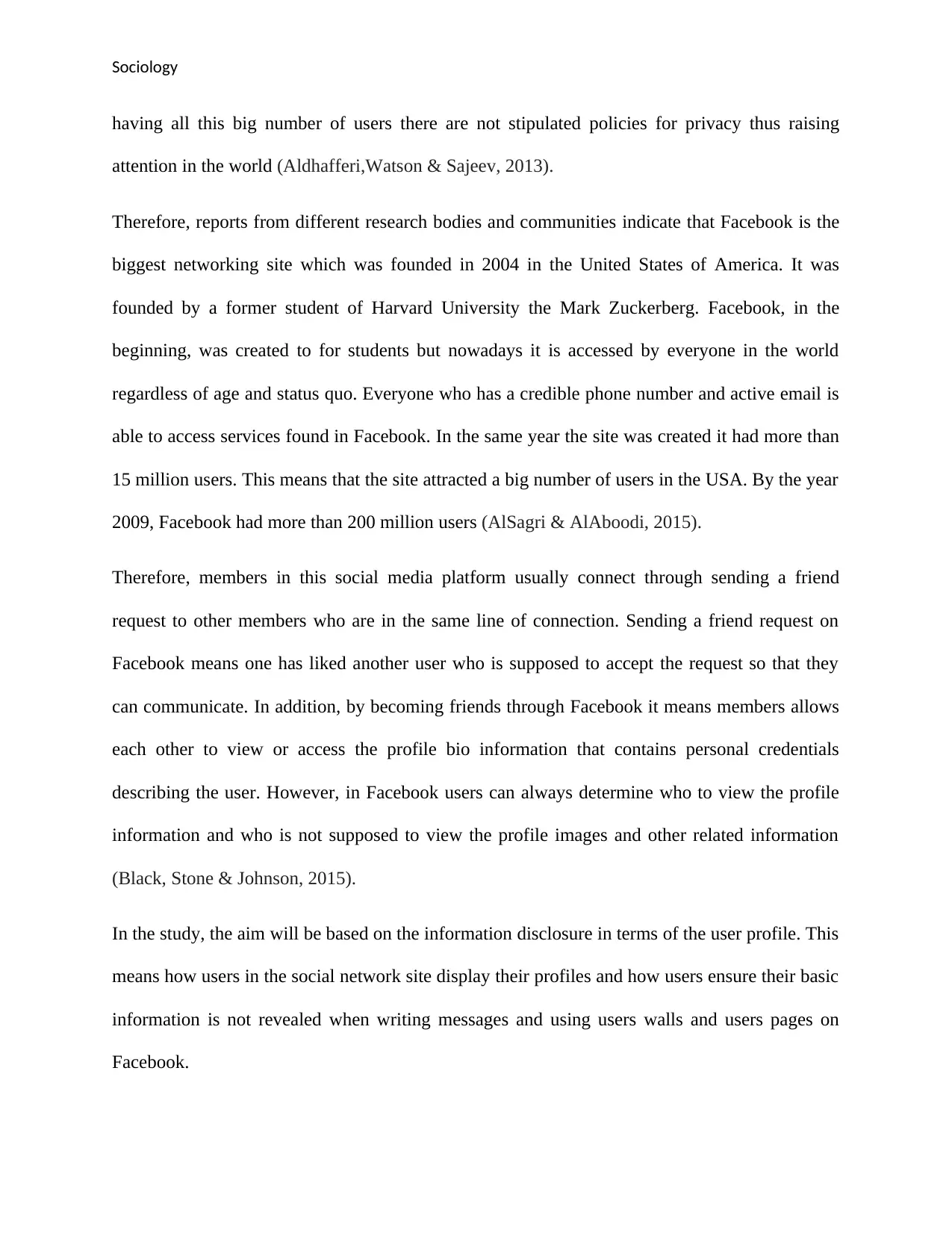
Sociology
having all this big number of users there are not stipulated policies for privacy thus raising
attention in the world (Aldhafferi,Watson & Sajeev, 2013).
Therefore, reports from different research bodies and communities indicate that Facebook is the
biggest networking site which was founded in 2004 in the United States of America. It was
founded by a former student of Harvard University the Mark Zuckerberg. Facebook, in the
beginning, was created to for students but nowadays it is accessed by everyone in the world
regardless of age and status quo. Everyone who has a credible phone number and active email is
able to access services found in Facebook. In the same year the site was created it had more than
15 million users. This means that the site attracted a big number of users in the USA. By the year
2009, Facebook had more than 200 million users (AlSagri & AlAboodi, 2015).
Therefore, members in this social media platform usually connect through sending a friend
request to other members who are in the same line of connection. Sending a friend request on
Facebook means one has liked another user who is supposed to accept the request so that they
can communicate. In addition, by becoming friends through Facebook it means members allows
each other to view or access the profile bio information that contains personal credentials
describing the user. However, in Facebook users can always determine who to view the profile
information and who is not supposed to view the profile images and other related information
(Black, Stone & Johnson, 2015).
In the study, the aim will be based on the information disclosure in terms of the user profile. This
means how users in the social network site display their profiles and how users ensure their basic
information is not revealed when writing messages and using users walls and users pages on
Facebook.
having all this big number of users there are not stipulated policies for privacy thus raising
attention in the world (Aldhafferi,Watson & Sajeev, 2013).
Therefore, reports from different research bodies and communities indicate that Facebook is the
biggest networking site which was founded in 2004 in the United States of America. It was
founded by a former student of Harvard University the Mark Zuckerberg. Facebook, in the
beginning, was created to for students but nowadays it is accessed by everyone in the world
regardless of age and status quo. Everyone who has a credible phone number and active email is
able to access services found in Facebook. In the same year the site was created it had more than
15 million users. This means that the site attracted a big number of users in the USA. By the year
2009, Facebook had more than 200 million users (AlSagri & AlAboodi, 2015).
Therefore, members in this social media platform usually connect through sending a friend
request to other members who are in the same line of connection. Sending a friend request on
Facebook means one has liked another user who is supposed to accept the request so that they
can communicate. In addition, by becoming friends through Facebook it means members allows
each other to view or access the profile bio information that contains personal credentials
describing the user. However, in Facebook users can always determine who to view the profile
information and who is not supposed to view the profile images and other related information
(Black, Stone & Johnson, 2015).
In the study, the aim will be based on the information disclosure in terms of the user profile. This
means how users in the social network site display their profiles and how users ensure their basic
information is not revealed when writing messages and using users walls and users pages on
Facebook.
⊘ This is a preview!⊘
Do you want full access?
Subscribe today to unlock all pages.

Trusted by 1+ million students worldwide
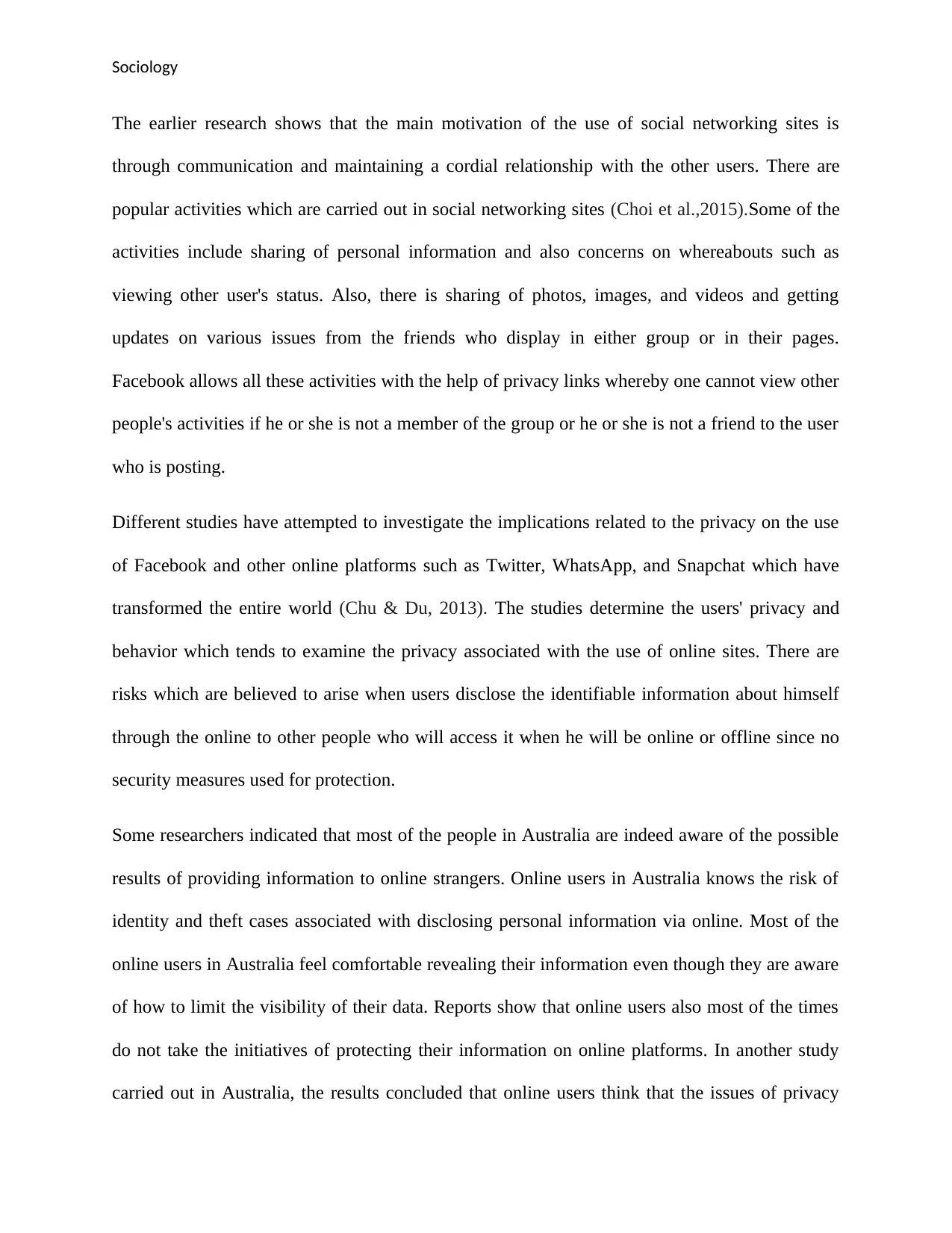
Sociology
The earlier research shows that the main motivation of the use of social networking sites is
through communication and maintaining a cordial relationship with the other users. There are
popular activities which are carried out in social networking sites (Choi et al.,2015).Some of the
activities include sharing of personal information and also concerns on whereabouts such as
viewing other user's status. Also, there is sharing of photos, images, and videos and getting
updates on various issues from the friends who display in either group or in their pages.
Facebook allows all these activities with the help of privacy links whereby one cannot view other
people's activities if he or she is not a member of the group or he or she is not a friend to the user
who is posting.
Different studies have attempted to investigate the implications related to the privacy on the use
of Facebook and other online platforms such as Twitter, WhatsApp, and Snapchat which have
transformed the entire world (Chu & Du, 2013). The studies determine the users' privacy and
behavior which tends to examine the privacy associated with the use of online sites. There are
risks which are believed to arise when users disclose the identifiable information about himself
through the online to other people who will access it when he will be online or offline since no
security measures used for protection.
Some researchers indicated that most of the people in Australia are indeed aware of the possible
results of providing information to online strangers. Online users in Australia knows the risk of
identity and theft cases associated with disclosing personal information via online. Most of the
online users in Australia feel comfortable revealing their information even though they are aware
of how to limit the visibility of their data. Reports show that online users also most of the times
do not take the initiatives of protecting their information on online platforms. In another study
carried out in Australia, the results concluded that online users think that the issues of privacy
The earlier research shows that the main motivation of the use of social networking sites is
through communication and maintaining a cordial relationship with the other users. There are
popular activities which are carried out in social networking sites (Choi et al.,2015).Some of the
activities include sharing of personal information and also concerns on whereabouts such as
viewing other user's status. Also, there is sharing of photos, images, and videos and getting
updates on various issues from the friends who display in either group or in their pages.
Facebook allows all these activities with the help of privacy links whereby one cannot view other
people's activities if he or she is not a member of the group or he or she is not a friend to the user
who is posting.
Different studies have attempted to investigate the implications related to the privacy on the use
of Facebook and other online platforms such as Twitter, WhatsApp, and Snapchat which have
transformed the entire world (Chu & Du, 2013). The studies determine the users' privacy and
behavior which tends to examine the privacy associated with the use of online sites. There are
risks which are believed to arise when users disclose the identifiable information about himself
through the online to other people who will access it when he will be online or offline since no
security measures used for protection.
Some researchers indicated that most of the people in Australia are indeed aware of the possible
results of providing information to online strangers. Online users in Australia knows the risk of
identity and theft cases associated with disclosing personal information via online. Most of the
online users in Australia feel comfortable revealing their information even though they are aware
of how to limit the visibility of their data. Reports show that online users also most of the times
do not take the initiatives of protecting their information on online platforms. In another study
carried out in Australia, the results concluded that online users think that the issues of privacy
Paraphrase This Document
Need a fresh take? Get an instant paraphrase of this document with our AI Paraphraser
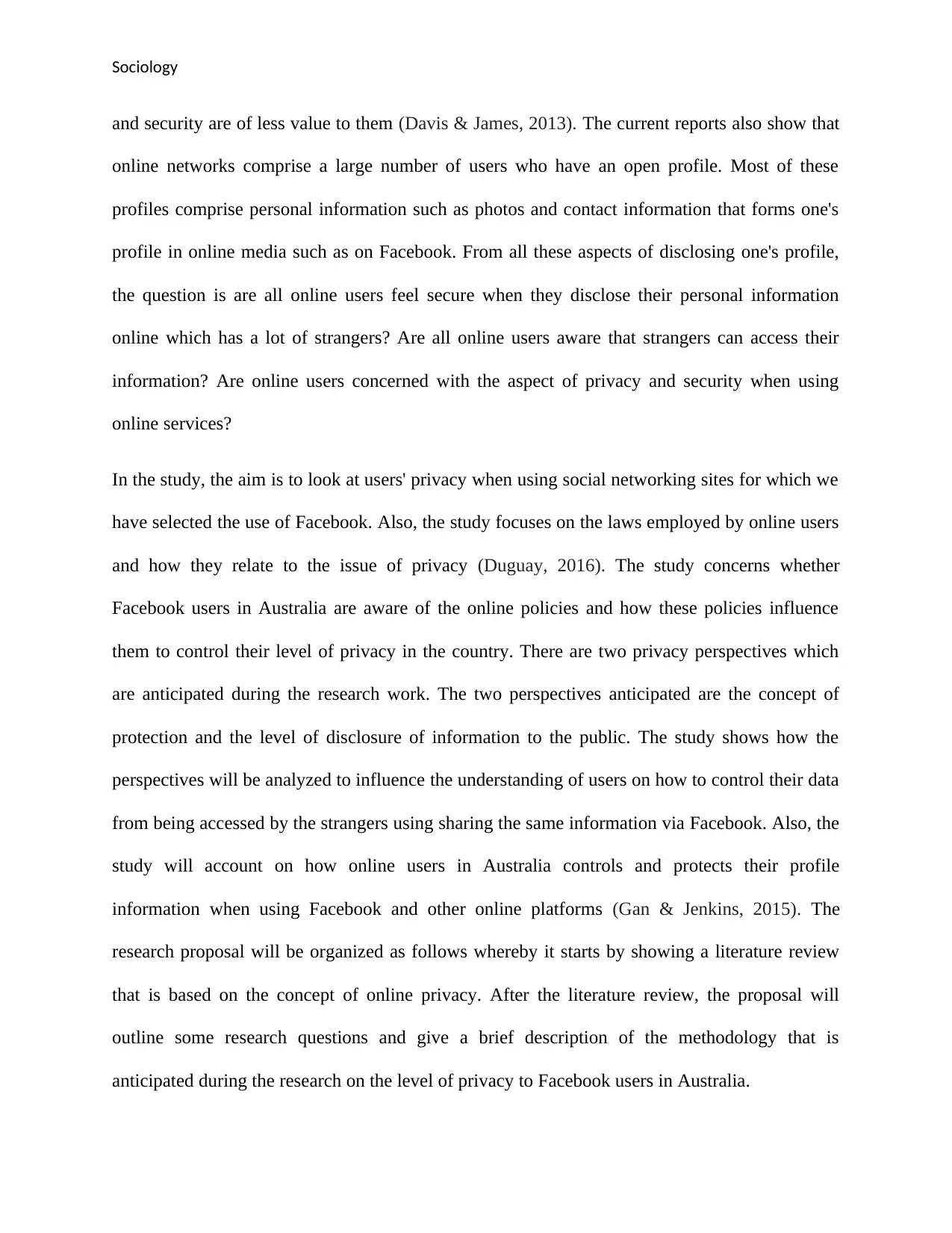
Sociology
and security are of less value to them (Davis & James, 2013). The current reports also show that
online networks comprise a large number of users who have an open profile. Most of these
profiles comprise personal information such as photos and contact information that forms one's
profile in online media such as on Facebook. From all these aspects of disclosing one's profile,
the question is are all online users feel secure when they disclose their personal information
online which has a lot of strangers? Are all online users aware that strangers can access their
information? Are online users concerned with the aspect of privacy and security when using
online services?
In the study, the aim is to look at users' privacy when using social networking sites for which we
have selected the use of Facebook. Also, the study focuses on the laws employed by online users
and how they relate to the issue of privacy (Duguay, 2016). The study concerns whether
Facebook users in Australia are aware of the online policies and how these policies influence
them to control their level of privacy in the country. There are two privacy perspectives which
are anticipated during the research work. The two perspectives anticipated are the concept of
protection and the level of disclosure of information to the public. The study shows how the
perspectives will be analyzed to influence the understanding of users on how to control their data
from being accessed by the strangers using sharing the same information via Facebook. Also, the
study will account on how online users in Australia controls and protects their profile
information when using Facebook and other online platforms (Gan & Jenkins, 2015). The
research proposal will be organized as follows whereby it starts by showing a literature review
that is based on the concept of online privacy. After the literature review, the proposal will
outline some research questions and give a brief description of the methodology that is
anticipated during the research on the level of privacy to Facebook users in Australia.
and security are of less value to them (Davis & James, 2013). The current reports also show that
online networks comprise a large number of users who have an open profile. Most of these
profiles comprise personal information such as photos and contact information that forms one's
profile in online media such as on Facebook. From all these aspects of disclosing one's profile,
the question is are all online users feel secure when they disclose their personal information
online which has a lot of strangers? Are all online users aware that strangers can access their
information? Are online users concerned with the aspect of privacy and security when using
online services?
In the study, the aim is to look at users' privacy when using social networking sites for which we
have selected the use of Facebook. Also, the study focuses on the laws employed by online users
and how they relate to the issue of privacy (Duguay, 2016). The study concerns whether
Facebook users in Australia are aware of the online policies and how these policies influence
them to control their level of privacy in the country. There are two privacy perspectives which
are anticipated during the research work. The two perspectives anticipated are the concept of
protection and the level of disclosure of information to the public. The study shows how the
perspectives will be analyzed to influence the understanding of users on how to control their data
from being accessed by the strangers using sharing the same information via Facebook. Also, the
study will account on how online users in Australia controls and protects their profile
information when using Facebook and other online platforms (Gan & Jenkins, 2015). The
research proposal will be organized as follows whereby it starts by showing a literature review
that is based on the concept of online privacy. After the literature review, the proposal will
outline some research questions and give a brief description of the methodology that is
anticipated during the research on the level of privacy to Facebook users in Australia.
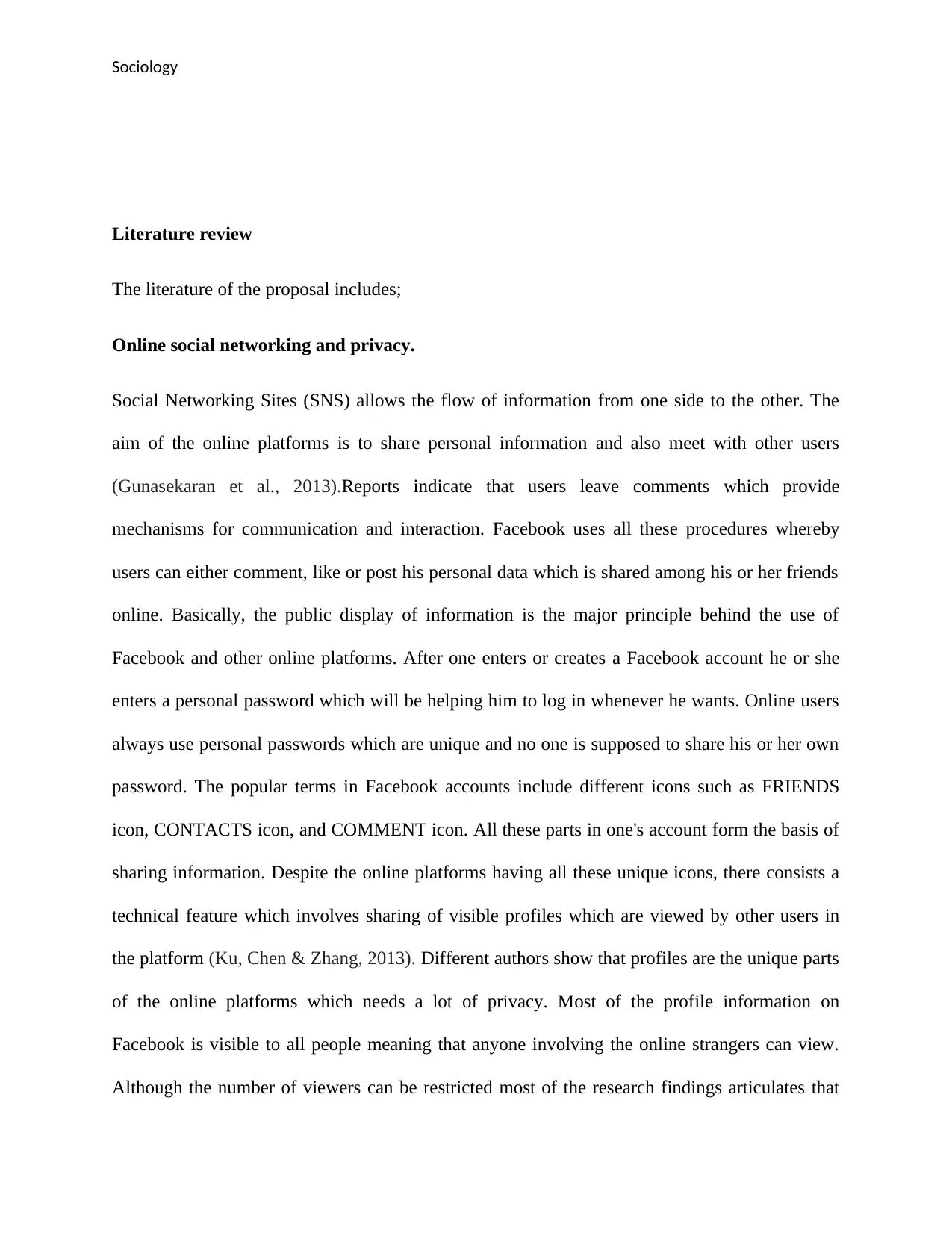
Sociology
Literature review
The literature of the proposal includes;
Online social networking and privacy.
Social Networking Sites (SNS) allows the flow of information from one side to the other. The
aim of the online platforms is to share personal information and also meet with other users
(Gunasekaran et al., 2013).Reports indicate that users leave comments which provide
mechanisms for communication and interaction. Facebook uses all these procedures whereby
users can either comment, like or post his personal data which is shared among his or her friends
online. Basically, the public display of information is the major principle behind the use of
Facebook and other online platforms. After one enters or creates a Facebook account he or she
enters a personal password which will be helping him to log in whenever he wants. Online users
always use personal passwords which are unique and no one is supposed to share his or her own
password. The popular terms in Facebook accounts include different icons such as FRIENDS
icon, CONTACTS icon, and COMMENT icon. All these parts in one's account form the basis of
sharing information. Despite the online platforms having all these unique icons, there consists a
technical feature which involves sharing of visible profiles which are viewed by other users in
the platform (Ku, Chen & Zhang, 2013). Different authors show that profiles are the unique parts
of the online platforms which needs a lot of privacy. Most of the profile information on
Facebook is visible to all people meaning that anyone involving the online strangers can view.
Although the number of viewers can be restricted most of the research findings articulates that
Literature review
The literature of the proposal includes;
Online social networking and privacy.
Social Networking Sites (SNS) allows the flow of information from one side to the other. The
aim of the online platforms is to share personal information and also meet with other users
(Gunasekaran et al., 2013).Reports indicate that users leave comments which provide
mechanisms for communication and interaction. Facebook uses all these procedures whereby
users can either comment, like or post his personal data which is shared among his or her friends
online. Basically, the public display of information is the major principle behind the use of
Facebook and other online platforms. After one enters or creates a Facebook account he or she
enters a personal password which will be helping him to log in whenever he wants. Online users
always use personal passwords which are unique and no one is supposed to share his or her own
password. The popular terms in Facebook accounts include different icons such as FRIENDS
icon, CONTACTS icon, and COMMENT icon. All these parts in one's account form the basis of
sharing information. Despite the online platforms having all these unique icons, there consists a
technical feature which involves sharing of visible profiles which are viewed by other users in
the platform (Ku, Chen & Zhang, 2013). Different authors show that profiles are the unique parts
of the online platforms which needs a lot of privacy. Most of the profile information on
Facebook is visible to all people meaning that anyone involving the online strangers can view.
Although the number of viewers can be restricted most of the research findings articulates that
⊘ This is a preview!⊘
Do you want full access?
Subscribe today to unlock all pages.

Trusted by 1+ million students worldwide
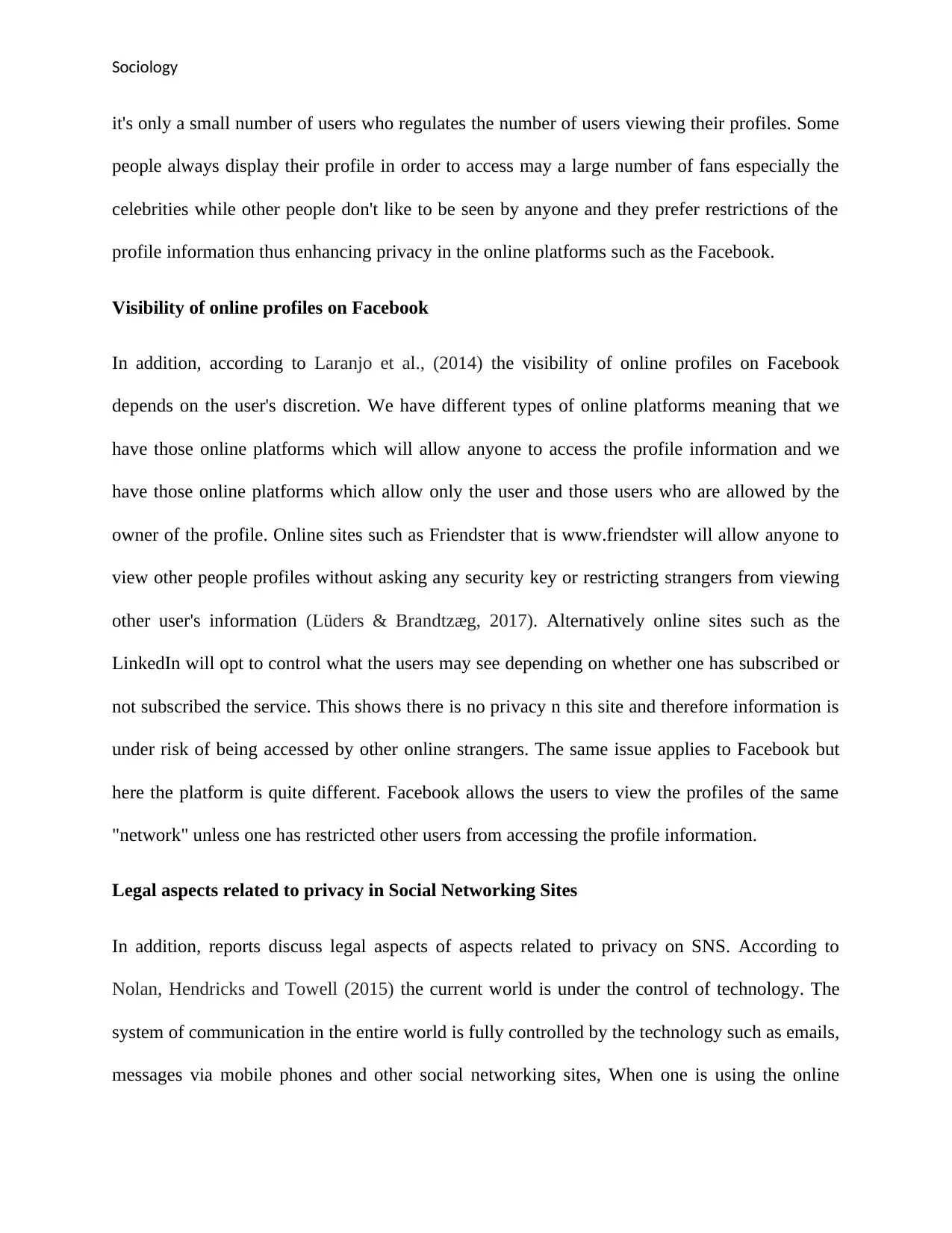
Sociology
it's only a small number of users who regulates the number of users viewing their profiles. Some
people always display their profile in order to access may a large number of fans especially the
celebrities while other people don't like to be seen by anyone and they prefer restrictions of the
profile information thus enhancing privacy in the online platforms such as the Facebook.
Visibility of online profiles on Facebook
In addition, according to Laranjo et al., (2014) the visibility of online profiles on Facebook
depends on the user's discretion. We have different types of online platforms meaning that we
have those online platforms which will allow anyone to access the profile information and we
have those online platforms which allow only the user and those users who are allowed by the
owner of the profile. Online sites such as Friendster that is www.friendster will allow anyone to
view other people profiles without asking any security key or restricting strangers from viewing
other user's information (Lüders & Brandtzæg, 2017). Alternatively online sites such as the
LinkedIn will opt to control what the users may see depending on whether one has subscribed or
not subscribed the service. This shows there is no privacy n this site and therefore information is
under risk of being accessed by other online strangers. The same issue applies to Facebook but
here the platform is quite different. Facebook allows the users to view the profiles of the same
"network" unless one has restricted other users from accessing the profile information.
Legal aspects related to privacy in Social Networking Sites
In addition, reports discuss legal aspects of aspects related to privacy on SNS. According to
Nolan, Hendricks and Towell (2015) the current world is under the control of technology. The
system of communication in the entire world is fully controlled by the technology such as emails,
messages via mobile phones and other social networking sites, When one is using the online
it's only a small number of users who regulates the number of users viewing their profiles. Some
people always display their profile in order to access may a large number of fans especially the
celebrities while other people don't like to be seen by anyone and they prefer restrictions of the
profile information thus enhancing privacy in the online platforms such as the Facebook.
Visibility of online profiles on Facebook
In addition, according to Laranjo et al., (2014) the visibility of online profiles on Facebook
depends on the user's discretion. We have different types of online platforms meaning that we
have those online platforms which will allow anyone to access the profile information and we
have those online platforms which allow only the user and those users who are allowed by the
owner of the profile. Online sites such as Friendster that is www.friendster will allow anyone to
view other people profiles without asking any security key or restricting strangers from viewing
other user's information (Lüders & Brandtzæg, 2017). Alternatively online sites such as the
LinkedIn will opt to control what the users may see depending on whether one has subscribed or
not subscribed the service. This shows there is no privacy n this site and therefore information is
under risk of being accessed by other online strangers. The same issue applies to Facebook but
here the platform is quite different. Facebook allows the users to view the profiles of the same
"network" unless one has restricted other users from accessing the profile information.
Legal aspects related to privacy in Social Networking Sites
In addition, reports discuss legal aspects of aspects related to privacy on SNS. According to
Nolan, Hendricks and Towell (2015) the current world is under the control of technology. The
system of communication in the entire world is fully controlled by the technology such as emails,
messages via mobile phones and other social networking sites, When one is using the online
Paraphrase This Document
Need a fresh take? Get an instant paraphrase of this document with our AI Paraphraser
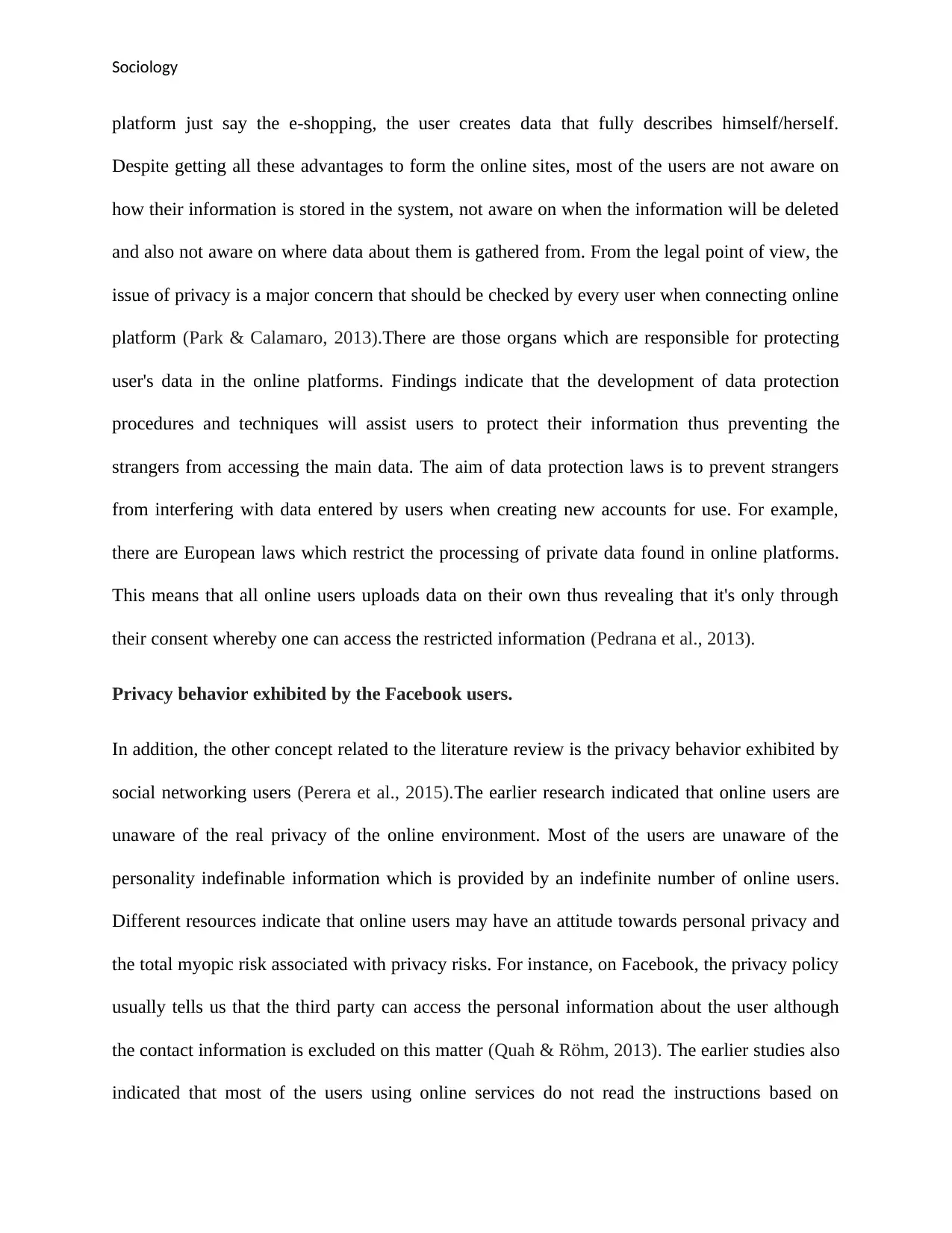
Sociology
platform just say the e-shopping, the user creates data that fully describes himself/herself.
Despite getting all these advantages to form the online sites, most of the users are not aware on
how their information is stored in the system, not aware on when the information will be deleted
and also not aware on where data about them is gathered from. From the legal point of view, the
issue of privacy is a major concern that should be checked by every user when connecting online
platform (Park & Calamaro, 2013).There are those organs which are responsible for protecting
user's data in the online platforms. Findings indicate that the development of data protection
procedures and techniques will assist users to protect their information thus preventing the
strangers from accessing the main data. The aim of data protection laws is to prevent strangers
from interfering with data entered by users when creating new accounts for use. For example,
there are European laws which restrict the processing of private data found in online platforms.
This means that all online users uploads data on their own thus revealing that it's only through
their consent whereby one can access the restricted information (Pedrana et al., 2013).
Privacy behavior exhibited by the Facebook users.
In addition, the other concept related to the literature review is the privacy behavior exhibited by
social networking users (Perera et al., 2015).The earlier research indicated that online users are
unaware of the real privacy of the online environment. Most of the users are unaware of the
personality indefinable information which is provided by an indefinite number of online users.
Different resources indicate that online users may have an attitude towards personal privacy and
the total myopic risk associated with privacy risks. For instance, on Facebook, the privacy policy
usually tells us that the third party can access the personal information about the user although
the contact information is excluded on this matter (Quah & Röhm, 2013). The earlier studies also
indicated that most of the users using online services do not read the instructions based on
platform just say the e-shopping, the user creates data that fully describes himself/herself.
Despite getting all these advantages to form the online sites, most of the users are not aware on
how their information is stored in the system, not aware on when the information will be deleted
and also not aware on where data about them is gathered from. From the legal point of view, the
issue of privacy is a major concern that should be checked by every user when connecting online
platform (Park & Calamaro, 2013).There are those organs which are responsible for protecting
user's data in the online platforms. Findings indicate that the development of data protection
procedures and techniques will assist users to protect their information thus preventing the
strangers from accessing the main data. The aim of data protection laws is to prevent strangers
from interfering with data entered by users when creating new accounts for use. For example,
there are European laws which restrict the processing of private data found in online platforms.
This means that all online users uploads data on their own thus revealing that it's only through
their consent whereby one can access the restricted information (Pedrana et al., 2013).
Privacy behavior exhibited by the Facebook users.
In addition, the other concept related to the literature review is the privacy behavior exhibited by
social networking users (Perera et al., 2015).The earlier research indicated that online users are
unaware of the real privacy of the online environment. Most of the users are unaware of the
personality indefinable information which is provided by an indefinite number of online users.
Different resources indicate that online users may have an attitude towards personal privacy and
the total myopic risk associated with privacy risks. For instance, on Facebook, the privacy policy
usually tells us that the third party can access the personal information about the user although
the contact information is excluded on this matter (Quah & Röhm, 2013). The earlier studies also
indicated that most of the users using online services do not read the instructions based on
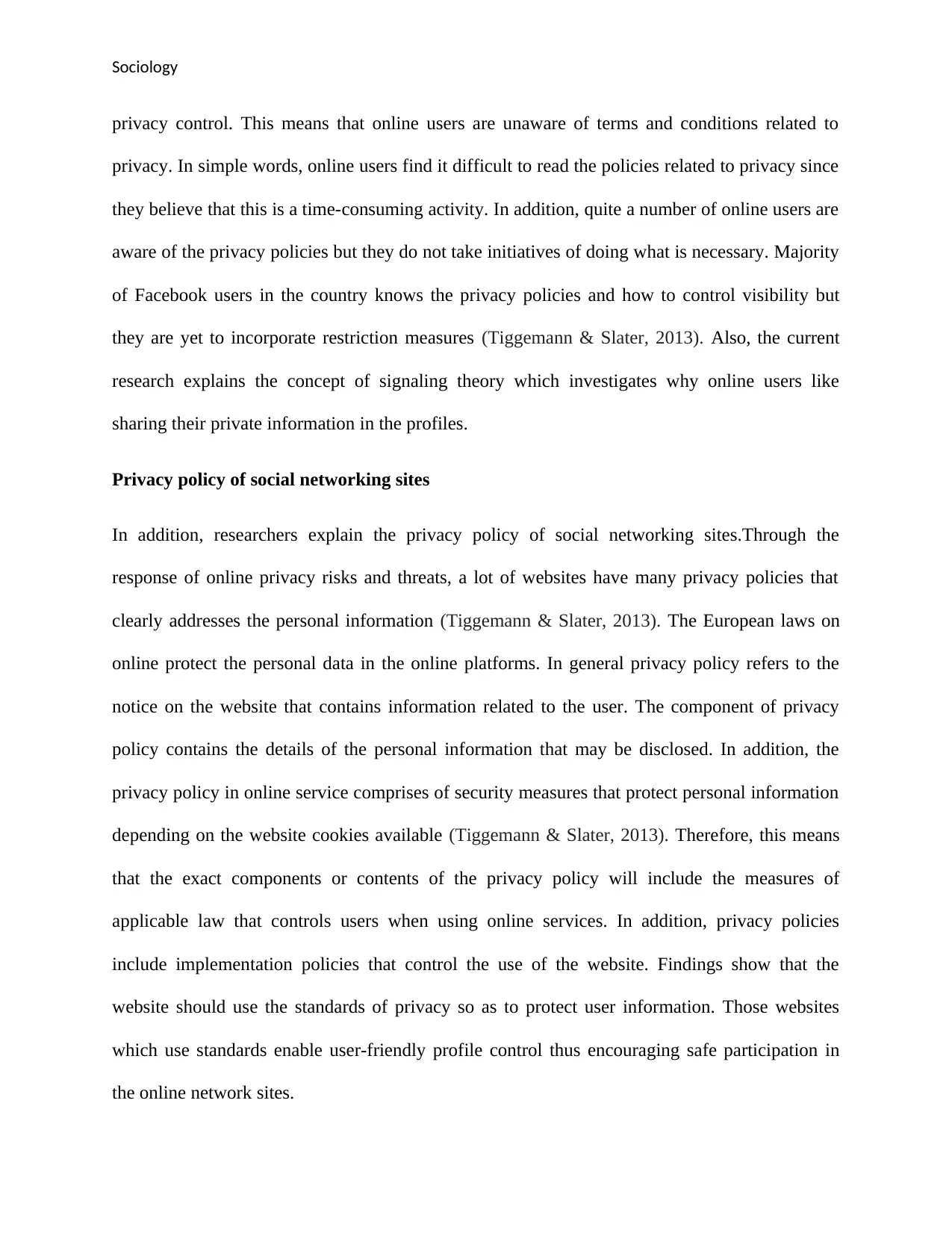
Sociology
privacy control. This means that online users are unaware of terms and conditions related to
privacy. In simple words, online users find it difficult to read the policies related to privacy since
they believe that this is a time-consuming activity. In addition, quite a number of online users are
aware of the privacy policies but they do not take initiatives of doing what is necessary. Majority
of Facebook users in the country knows the privacy policies and how to control visibility but
they are yet to incorporate restriction measures (Tiggemann & Slater, 2013). Also, the current
research explains the concept of signaling theory which investigates why online users like
sharing their private information in the profiles.
Privacy policy of social networking sites
In addition, researchers explain the privacy policy of social networking sites.Through the
response of online privacy risks and threats, a lot of websites have many privacy policies that
clearly addresses the personal information (Tiggemann & Slater, 2013). The European laws on
online protect the personal data in the online platforms. In general privacy policy refers to the
notice on the website that contains information related to the user. The component of privacy
policy contains the details of the personal information that may be disclosed. In addition, the
privacy policy in online service comprises of security measures that protect personal information
depending on the website cookies available (Tiggemann & Slater, 2013). Therefore, this means
that the exact components or contents of the privacy policy will include the measures of
applicable law that controls users when using online services. In addition, privacy policies
include implementation policies that control the use of the website. Findings show that the
website should use the standards of privacy so as to protect user information. Those websites
which use standards enable user-friendly profile control thus encouraging safe participation in
the online network sites.
privacy control. This means that online users are unaware of terms and conditions related to
privacy. In simple words, online users find it difficult to read the policies related to privacy since
they believe that this is a time-consuming activity. In addition, quite a number of online users are
aware of the privacy policies but they do not take initiatives of doing what is necessary. Majority
of Facebook users in the country knows the privacy policies and how to control visibility but
they are yet to incorporate restriction measures (Tiggemann & Slater, 2013). Also, the current
research explains the concept of signaling theory which investigates why online users like
sharing their private information in the profiles.
Privacy policy of social networking sites
In addition, researchers explain the privacy policy of social networking sites.Through the
response of online privacy risks and threats, a lot of websites have many privacy policies that
clearly addresses the personal information (Tiggemann & Slater, 2013). The European laws on
online protect the personal data in the online platforms. In general privacy policy refers to the
notice on the website that contains information related to the user. The component of privacy
policy contains the details of the personal information that may be disclosed. In addition, the
privacy policy in online service comprises of security measures that protect personal information
depending on the website cookies available (Tiggemann & Slater, 2013). Therefore, this means
that the exact components or contents of the privacy policy will include the measures of
applicable law that controls users when using online services. In addition, privacy policies
include implementation policies that control the use of the website. Findings show that the
website should use the standards of privacy so as to protect user information. Those websites
which use standards enable user-friendly profile control thus encouraging safe participation in
the online network sites.
⊘ This is a preview!⊘
Do you want full access?
Subscribe today to unlock all pages.

Trusted by 1+ million students worldwide
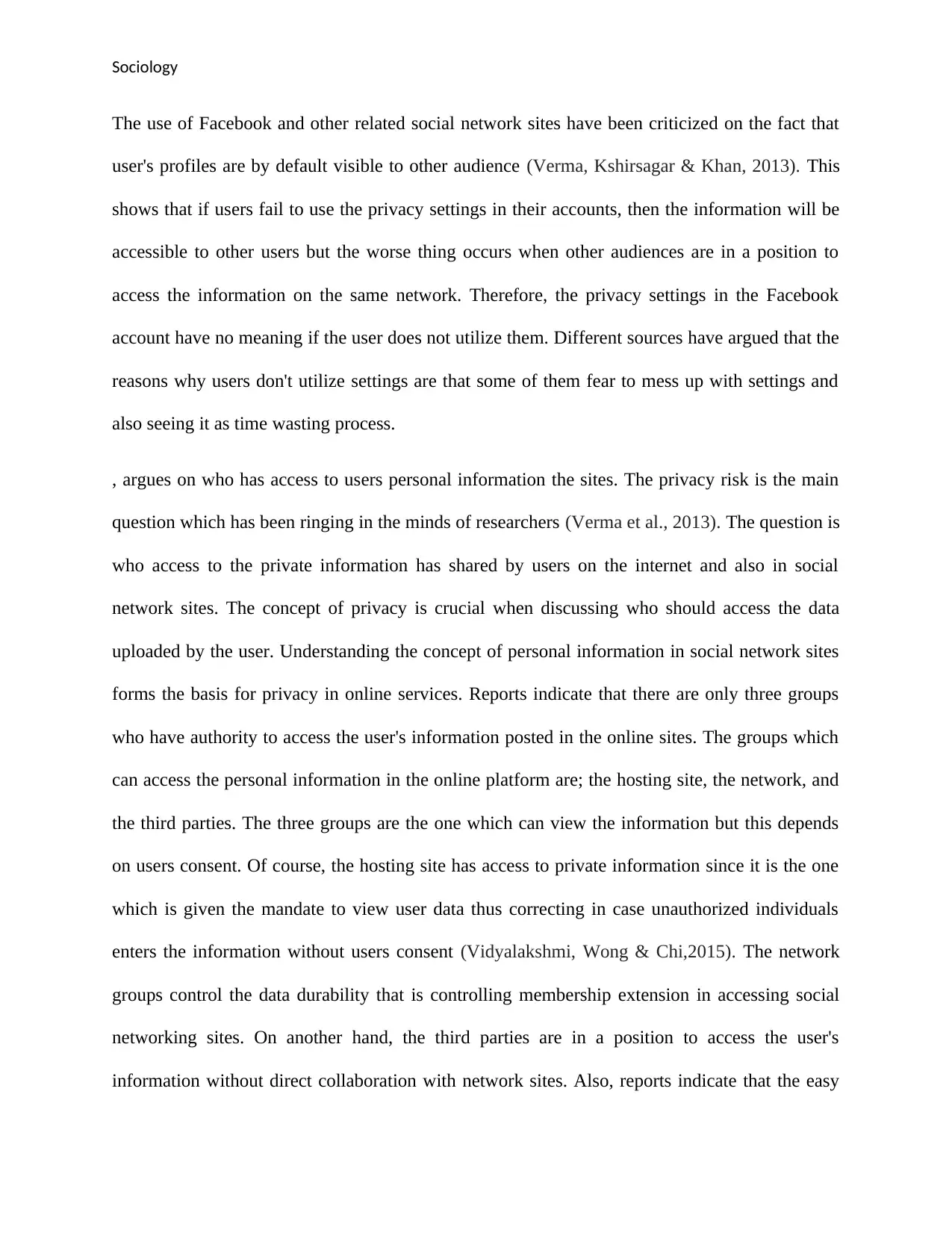
Sociology
The use of Facebook and other related social network sites have been criticized on the fact that
user's profiles are by default visible to other audience (Verma, Kshirsagar & Khan, 2013). This
shows that if users fail to use the privacy settings in their accounts, then the information will be
accessible to other users but the worse thing occurs when other audiences are in a position to
access the information on the same network. Therefore, the privacy settings in the Facebook
account have no meaning if the user does not utilize them. Different sources have argued that the
reasons why users don't utilize settings are that some of them fear to mess up with settings and
also seeing it as time wasting process.
, argues on who has access to users personal information the sites. The privacy risk is the main
question which has been ringing in the minds of researchers (Verma et al., 2013). The question is
who access to the private information has shared by users on the internet and also in social
network sites. The concept of privacy is crucial when discussing who should access the data
uploaded by the user. Understanding the concept of personal information in social network sites
forms the basis for privacy in online services. Reports indicate that there are only three groups
who have authority to access the user's information posted in the online sites. The groups which
can access the personal information in the online platform are; the hosting site, the network, and
the third parties. The three groups are the one which can view the information but this depends
on users consent. Of course, the hosting site has access to private information since it is the one
which is given the mandate to view user data thus correcting in case unauthorized individuals
enters the information without users consent (Vidyalakshmi, Wong & Chi,2015). The network
groups control the data durability that is controlling membership extension in accessing social
networking sites. On another hand, the third parties are in a position to access the user's
information without direct collaboration with network sites. Also, reports indicate that the easy
The use of Facebook and other related social network sites have been criticized on the fact that
user's profiles are by default visible to other audience (Verma, Kshirsagar & Khan, 2013). This
shows that if users fail to use the privacy settings in their accounts, then the information will be
accessible to other users but the worse thing occurs when other audiences are in a position to
access the information on the same network. Therefore, the privacy settings in the Facebook
account have no meaning if the user does not utilize them. Different sources have argued that the
reasons why users don't utilize settings are that some of them fear to mess up with settings and
also seeing it as time wasting process.
, argues on who has access to users personal information the sites. The privacy risk is the main
question which has been ringing in the minds of researchers (Verma et al., 2013). The question is
who access to the private information has shared by users on the internet and also in social
network sites. The concept of privacy is crucial when discussing who should access the data
uploaded by the user. Understanding the concept of personal information in social network sites
forms the basis for privacy in online services. Reports indicate that there are only three groups
who have authority to access the user's information posted in the online sites. The groups which
can access the personal information in the online platform are; the hosting site, the network, and
the third parties. The three groups are the one which can view the information but this depends
on users consent. Of course, the hosting site has access to private information since it is the one
which is given the mandate to view user data thus correcting in case unauthorized individuals
enters the information without users consent (Vidyalakshmi, Wong & Chi,2015). The network
groups control the data durability that is controlling membership extension in accessing social
networking sites. On another hand, the third parties are in a position to access the user's
information without direct collaboration with network sites. Also, reports indicate that the easy
Paraphrase This Document
Need a fresh take? Get an instant paraphrase of this document with our AI Paraphraser
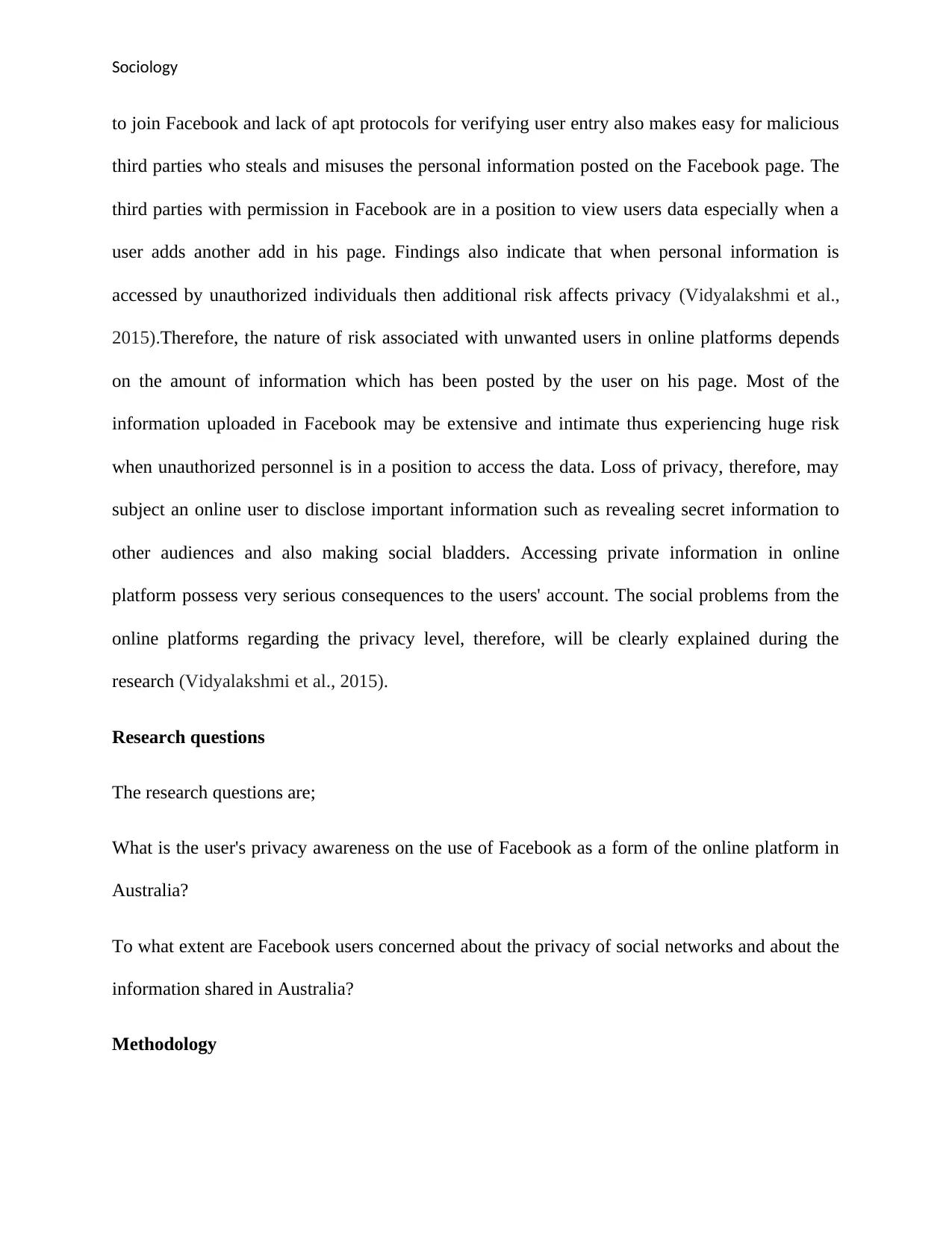
Sociology
to join Facebook and lack of apt protocols for verifying user entry also makes easy for malicious
third parties who steals and misuses the personal information posted on the Facebook page. The
third parties with permission in Facebook are in a position to view users data especially when a
user adds another add in his page. Findings also indicate that when personal information is
accessed by unauthorized individuals then additional risk affects privacy (Vidyalakshmi et al.,
2015).Therefore, the nature of risk associated with unwanted users in online platforms depends
on the amount of information which has been posted by the user on his page. Most of the
information uploaded in Facebook may be extensive and intimate thus experiencing huge risk
when unauthorized personnel is in a position to access the data. Loss of privacy, therefore, may
subject an online user to disclose important information such as revealing secret information to
other audiences and also making social bladders. Accessing private information in online
platform possess very serious consequences to the users' account. The social problems from the
online platforms regarding the privacy level, therefore, will be clearly explained during the
research (Vidyalakshmi et al., 2015).
Research questions
The research questions are;
What is the user's privacy awareness on the use of Facebook as a form of the online platform in
Australia?
To what extent are Facebook users concerned about the privacy of social networks and about the
information shared in Australia?
Methodology
to join Facebook and lack of apt protocols for verifying user entry also makes easy for malicious
third parties who steals and misuses the personal information posted on the Facebook page. The
third parties with permission in Facebook are in a position to view users data especially when a
user adds another add in his page. Findings also indicate that when personal information is
accessed by unauthorized individuals then additional risk affects privacy (Vidyalakshmi et al.,
2015).Therefore, the nature of risk associated with unwanted users in online platforms depends
on the amount of information which has been posted by the user on his page. Most of the
information uploaded in Facebook may be extensive and intimate thus experiencing huge risk
when unauthorized personnel is in a position to access the data. Loss of privacy, therefore, may
subject an online user to disclose important information such as revealing secret information to
other audiences and also making social bladders. Accessing private information in online
platform possess very serious consequences to the users' account. The social problems from the
online platforms regarding the privacy level, therefore, will be clearly explained during the
research (Vidyalakshmi et al., 2015).
Research questions
The research questions are;
What is the user's privacy awareness on the use of Facebook as a form of the online platform in
Australia?
To what extent are Facebook users concerned about the privacy of social networks and about the
information shared in Australia?
Methodology
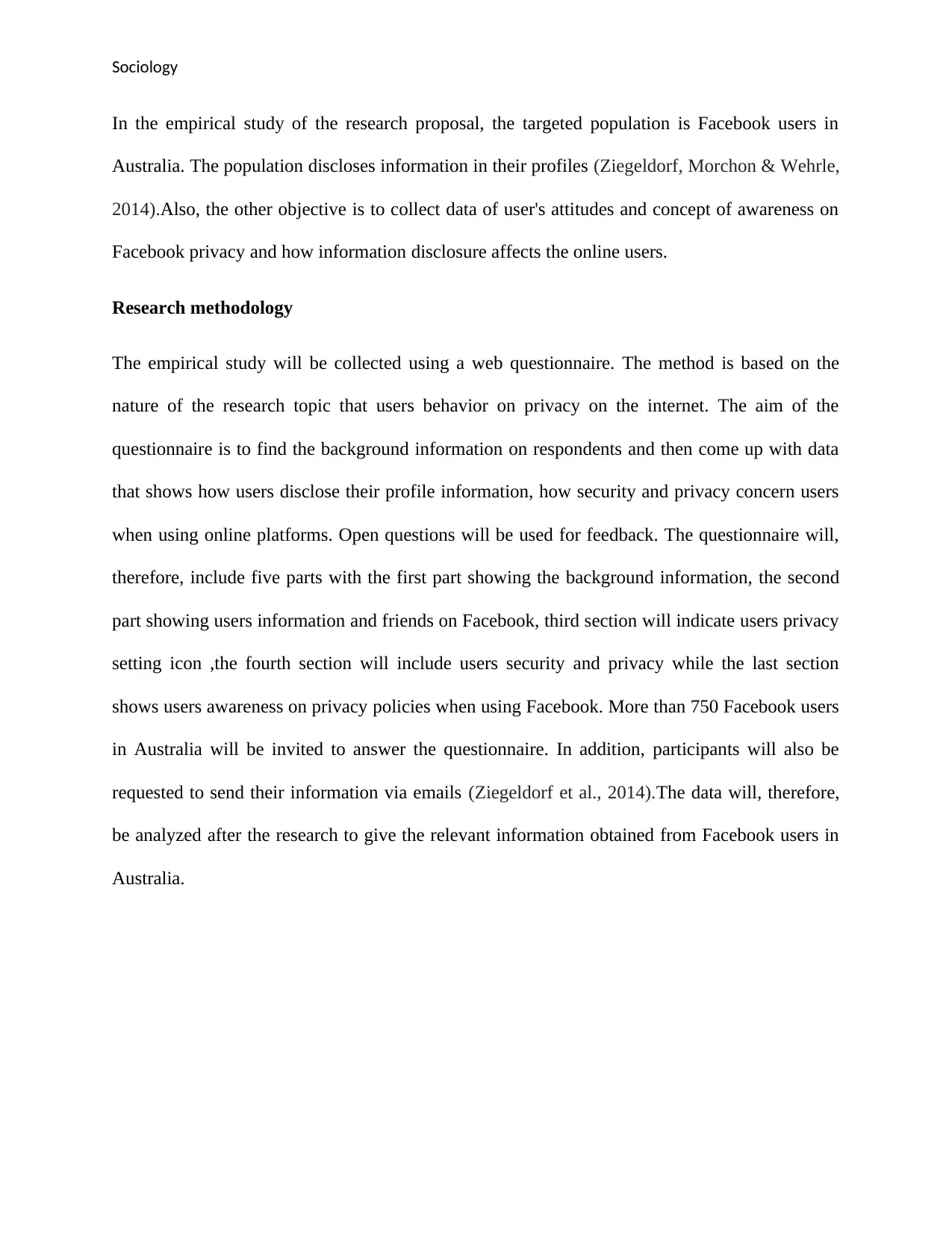
Sociology
In the empirical study of the research proposal, the targeted population is Facebook users in
Australia. The population discloses information in their profiles (Ziegeldorf, Morchon & Wehrle,
2014).Also, the other objective is to collect data of user's attitudes and concept of awareness on
Facebook privacy and how information disclosure affects the online users.
Research methodology
The empirical study will be collected using a web questionnaire. The method is based on the
nature of the research topic that users behavior on privacy on the internet. The aim of the
questionnaire is to find the background information on respondents and then come up with data
that shows how users disclose their profile information, how security and privacy concern users
when using online platforms. Open questions will be used for feedback. The questionnaire will,
therefore, include five parts with the first part showing the background information, the second
part showing users information and friends on Facebook, third section will indicate users privacy
setting icon ,the fourth section will include users security and privacy while the last section
shows users awareness on privacy policies when using Facebook. More than 750 Facebook users
in Australia will be invited to answer the questionnaire. In addition, participants will also be
requested to send their information via emails (Ziegeldorf et al., 2014).The data will, therefore,
be analyzed after the research to give the relevant information obtained from Facebook users in
Australia.
In the empirical study of the research proposal, the targeted population is Facebook users in
Australia. The population discloses information in their profiles (Ziegeldorf, Morchon & Wehrle,
2014).Also, the other objective is to collect data of user's attitudes and concept of awareness on
Facebook privacy and how information disclosure affects the online users.
Research methodology
The empirical study will be collected using a web questionnaire. The method is based on the
nature of the research topic that users behavior on privacy on the internet. The aim of the
questionnaire is to find the background information on respondents and then come up with data
that shows how users disclose their profile information, how security and privacy concern users
when using online platforms. Open questions will be used for feedback. The questionnaire will,
therefore, include five parts with the first part showing the background information, the second
part showing users information and friends on Facebook, third section will indicate users privacy
setting icon ,the fourth section will include users security and privacy while the last section
shows users awareness on privacy policies when using Facebook. More than 750 Facebook users
in Australia will be invited to answer the questionnaire. In addition, participants will also be
requested to send their information via emails (Ziegeldorf et al., 2014).The data will, therefore,
be analyzed after the research to give the relevant information obtained from Facebook users in
Australia.
⊘ This is a preview!⊘
Do you want full access?
Subscribe today to unlock all pages.

Trusted by 1+ million students worldwide
1 out of 16
Related Documents
Your All-in-One AI-Powered Toolkit for Academic Success.
+13062052269
info@desklib.com
Available 24*7 on WhatsApp / Email
![[object Object]](/_next/static/media/star-bottom.7253800d.svg)
Unlock your academic potential
Copyright © 2020–2026 A2Z Services. All Rights Reserved. Developed and managed by ZUCOL.





